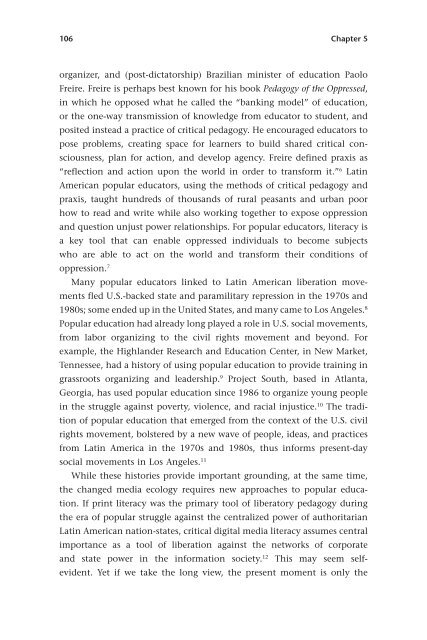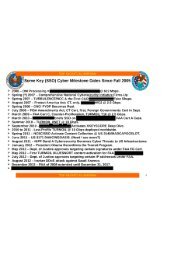- Page 2:
Out of the Shadows, Into the Street
- Page 6:
We are multitudes. No conocemos las
- Page 10 and 11:
ForewordManuel CastellsOver the las
- Page 12 and 13:
Forewordxipretend that Twitter, Fac
- Page 14:
Author ’ s NoteThe author will do
- Page 18 and 19:
AcknowledgmentsxviiI am thrilled to
- Page 20:
AcknowledgmentsxixAbiqui ú , you h
- Page 23 and 24:
2 Introductionmarches as an opportu
- Page 25 and 26:
4 Introductionwith community organi
- Page 27 and 28:
6 IntroductionThe Revolution Will B
- Page 29 and 30:
8 IntroductionThis cycle of struggl
- Page 31 and 32:
10 IntroductionThis was not always
- Page 33:
12 Introductionto organize their co
- Page 37:
16 Introductionmedia literacy, tool
- Page 40 and 41:
Introduction 19can see it unfolding
- Page 42 and 43:
1 A Day Without an Immigrant: Socia
- Page 44 and 45:
A Day Without an Immigrant 23Sensen
- Page 47 and 48:
26 Chapter 1While the mass marches
- Page 49 and 50:
28 Chapter 1and ideas was through i
- Page 51 and 52:
30 Chapter 1of placing its stories
- Page 53 and 54:
32 Chapter 1When talking about immi
- Page 55 and 56:
34 Chapter 1origin and replace them
- Page 57 and 58:
36 Chapter 1immigrant communities.
- Page 59 and 60:
38 Chapter 1immigrant rights activi
- Page 61 and 62:
40 Chapter 1Social MediaIn the curr
- Page 63 and 64:
42 Chapter 1He said that a few year
- Page 65 and 66:
44 Chapter 1new relationships with
- Page 67 and 68:
Figure 2.1Walkout Warriors sticker,
- Page 69 and 70:
48 Chapter 2and took care to analyz
- Page 71 and 72:
50 Chapter 2that it blinds us to a
- Page 73 and 74:
52 Chapter 2Students created a wide
- Page 75 and 76: 54 Chapter 2They also used real-tim
- Page 77 and 78: 56 Chapter 2in 1994 during the batt
- Page 79 and 80: 58 Chapter 2Mexican was also widely
- Page 81 and 82: 60 Chapter 2One activist I intervie
- Page 83 and 84: 62 Chapter 2mentioning the continue
- Page 85 and 86: 64 Chapter 2people from a mix of ba
- Page 87 and 88: 66 Chapter 2Transmedia Organizing:
- Page 89 and 90: Figure 3.1MacArthur Park May Day im
- Page 91 and 92: 70 Chapter 3rely entirely on broadc
- Page 93 and 94: 72 Chapter 3Figure 3.2Fox News cove
- Page 95 and 96: 74 Chapter 3nonviolent protest in t
- Page 97 and 98: 76 Chapter 3from over a dozen camer
- Page 99 and 100: 78 Chapter 3First and foremost, ove
- Page 101 and 102: 80 Chapter 3spokespeople to being a
- Page 103 and 104: 82 Chapter 3scene. At a DREAM Act r
- Page 105 and 106: 84 Chapter 3the population, althoug
- Page 107 and 108: Figure 4.1APPO occupies Oaxacan sta
- Page 109 and 110: 88 Chapter 4indigenous Oaxacan migr
- Page 111 and 112: 90 Chapter 4difficult for them to m
- Page 113 and 114: 92 Chapter 4communicating across th
- Page 115 and 116: 94 Chapter 4I remember those huge v
- Page 117 and 118: 96 Chapter 4previous section, enabl
- Page 119 and 120: 98 Chapter 4I had worked with Will
- Page 121 and 122: 100 Chapter 4Figure 4.4APPO-LA prot
- Page 123 and 124: Figure 5.1VozMob (Voces M ó viles
- Page 125: 104 Chapter 5online webinar with re
- Page 129 and 130: 108 Chapter 5a basic requirement fo
- Page 131 and 132: 110 Chapter 5means that critical di
- Page 133 and 134: 112 Chapter 5laborers and domestic
- Page 135 and 136: 114 Chapter 5around the country, to
- Page 137 and 138: 116 Chapter 5content circulation wo
- Page 139 and 140: 118 Chapter 5While low initial leve
- Page 141 and 142: 120 Chapter 5It was work around how
- Page 143 and 144: 122 Chapter 5oppressive images and
- Page 145 and 146: 124 Chapter 5We started this projec
- Page 147 and 148: 126 Chapter 5literacy. Another acti
- Page 149 and 150: Figure 6.1Undocuqueer artist Julio
- Page 151 and 152: 130 Chapter 6halt deportations of D
- Page 153 and 154: 132 Chapter 6have organized an incr
- Page 155 and 156: 134 Chapter 6by which they can be r
- Page 157 and 158: 136 Chapter 6“ If you ’ re in a
- Page 159 and 160: 138 Chapter 6Rogelio Alejandro L ó
- Page 161 and 162: 140 Chapter 6who attended presentat
- Page 163 and 164: 142 Chapter 6or life-course approac
- Page 165 and 166: 144 Chapter 6activists got ideas ab
- Page 167 and 168: 146 Chapter 6the creation of Made i
- Page 169 and 170: 148 Chapter 6have encountered the c
- Page 171 and 172: 150 Chapter 6policy allies that dep
- Page 173 and 174: 152 Chapter 6Participation in movem
- Page 175 and 176: Figure 7.1Screenshot from FWD.us.So
- Page 177 and 178:
156 Chapter 7allow the agricultural
- Page 179 and 180:
158 Chapter 7to civic action throug
- Page 181 and 182:
160 Chapter 7game. UWD ’ s Share
- Page 183 and 184:
162 Chapter 7Overall, the project c
- Page 185 and 186:
164 Chapter 7least initially) had v
- Page 187 and 188:
166 Chapter 7Social movement groups
- Page 189 and 190:
168 Chapter 7affected to incorporat
- Page 191 and 192:
170 Chapter 7I just found, within o
- Page 193 and 194:
172 Chapter 7As we have seen, the d
- Page 195 and 196:
174 Chapter 7you have to think this
- Page 197 and 198:
176 Chapter 7between volunteer and
- Page 199 and 200:
178 Chapter 7adopting transmedia or
- Page 201 and 202:
180 ConclusionsThe past few years h
- Page 203 and 204:
182 Conclusionsmedia-making frequen
- Page 205 and 206:
184 Conclusionslocutores (radio hos
- Page 207 and 208:
186 Conclusionsand gain greater vis
- Page 209 and 210:
188 ConclusionsPraxis of Critical D
- Page 211 and 212:
190 Conclusionsimmigrant rights act
- Page 213 and 214:
192 Conclusionsof competition with
- Page 215 and 216:
194 Conclusionscontent that contain
- Page 217 and 218:
196 Conclusionsalso be fruitful to
- Page 219 and 220:
198 Conclusionsmovement networks. R
- Page 221 and 222:
200 ConclusionsEffective movement l
- Page 224:
Appendixes
- Page 227 and 228:
206 Appendix Aproduce a range of wo
- Page 229 and 230:
208 Appendix AI began to engage in
- Page 231 and 232:
210 Appendix Arecorder, with the ex
- Page 233 and 234:
212 Appendix Aparallel but basicall
- Page 236 and 237:
Appendix B: IntervieweesThis append
- Page 238 and 239:
Appendix C: Interview GuideThe foll
- Page 240 and 241:
Appendix C 219• Describe an examp
- Page 242:
Appendix D: Online Resources for Or
- Page 245 and 246:
224 Notes to Introduction9. Clay Sh
- Page 247 and 248:
226 Notes to Introductionmedia prac
- Page 249 and 250:
228 Notes to Chapter 16. Andreas Pe
- Page 251 and 252:
230 Notes to Chapter 139. Interview
- Page 253 and 254:
232 Notes to Chapter 179. To be exp
- Page 255 and 256:
234 Notes to Chapter 212. This text
- Page 257 and 258:
236 Notes to Chapter 32. Jes ú s V
- Page 259 and 260:
238 Notes to Chapter 439. Ibid.40.
- Page 261 and 262:
240 Notes to Chapter 531. Joel Simo
- Page 263 and 264:
242 Notes to Chapter 523. Henry Jen
- Page 265 and 266:
244 Notes to Chapter 554. Interview
- Page 267 and 268:
246 Notes to Chapter 62010061712455
- Page 269 and 270:
248 Notes to Chapter 643. Interview
- Page 271 and 272:
250 Notes to Chapter 73. Jose Anton
- Page 273 and 274:
252 Notes to Conclusions41. Intervi
- Page 275 and 276:
254 Notes to Appendix AAppendix A1.
- Page 278 and 279:
IndexNote: Page numbers in italics
- Page 280 and 281:
Index 259praxis of critical digital
- Page 282 and 283:
Index 261internal tensions and, 140
- Page 284 and 285:
Index 263Hip hop, 12, 58Hoffman, Re
- Page 286 and 287:
Index 265Made in L.A. (documentary
- Page 288 and 289:
Index 267Occupy movement, 8, 42, 17
- Page 290 and 291:
Index 269student walkouts and, 26,
- Page 292 and 293:
Index 271Top-down/vertical structur
- Page 294:
Index 273praxis of critical digital




